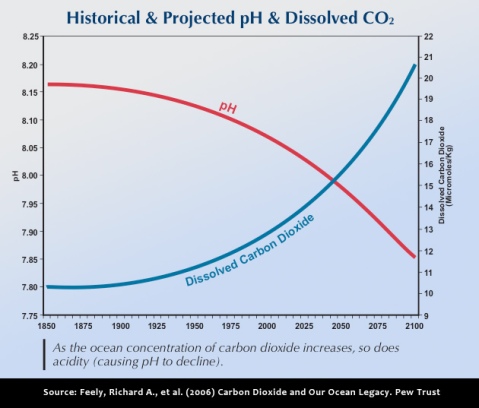Although I’ve been aware of climate change for a long time, its effect on the ocean apart from water levels rising never really occurred to me. I was surprised to hear about the ocean becoming more acidic, as it was something that’s never been brought up to me before, and it made me realize that climate change isn’t’ only effecting those on land. Now that I’m living in a coastal area, the problem seems that much more close to home. And although the changing oceans might not seem like a big deal to many, when you look closer you’ll see that not only does it have a huge impact on marine life, but on humans as well.
With climate change comes rising levels of carbon dioxide being trapped in the atmosphere. Although trees are seen as the primary source for absorbing carbon dioxide, the ocean does it’s part as well – not to mention that there’s much more carbon dioxide to absorb and less trees to do it thanks to deforestation. When the ocean has to absorb so much carbon dioxide, it’s pH level lowers.

By 2100, which isn’t far away in the grand scheme of things, it’s estimated that the ocean could become up to 150 times as acidic as it is now – which is more than it has been since over 20 million years ago. With this all happening in such a condensed period of time, it’s logical to say that the marine creatures won’t have time to adapt. Shell forming creatures like lobsters, shrimp, and plankton will take the biggest hit – acidity makes it much harder for their shells to form, because of the chemical reactions causing acidity in turn cause calcium carbonate (a major component of marine shells and skeletons) to dissolve. When these major food sources start decreasing, so will those who feed off of them.
An example of how a shell would dissolve in the predicted ph level for 2100. Credit to NOAA.
Another thing that the acidification leads to is acidosis. This causes a buildup of carbonic acid in the body fluids of marine animals, which leads to many problems, like a lowered immune system, reproductive issues, or even death. Yet another consequence of the acidity is that sounds can travel farther in water with lower pH levels (expected to be up to 70% faster by 2100). This can interfere with the communication of marine animals, like whales.
But how will this affect us?
Well, whether you eat fish or not, billions of people rely on them and their fellow marine animals as their main source of food. Providing food for the planet is already an issue – what would happen if all seafood was taken out of the equation? It would likely be a lot more drastic than you’d think. People would be out of food, out of jobs and an incredible ecosystem could be destroyed. Hopefully with lowering pollution that adds even more carbon dioxide, and helping keep the natural systems of the ocean, like fish populations, healthy and thriving we can help combat this issue.
-Catrina Miccicke
I encourage you to watch this video if you’d like to learn more –
Acid Test: The Global Challenge of Ocean Acidification
Further Reading:
What is Ocean Acidification? – NOAA
Ocean Acidification and Climate Change – Center for Ocean Solutions
Oceans and Climate Change – EPA


I was never really aware on just how much damage ocean acidification could cause. By reading your article I was able to learn about so many things that I couldn’t even fathom. The way you write is sincere and addresses the point firmly. I enjoyed reading so many important facts!!